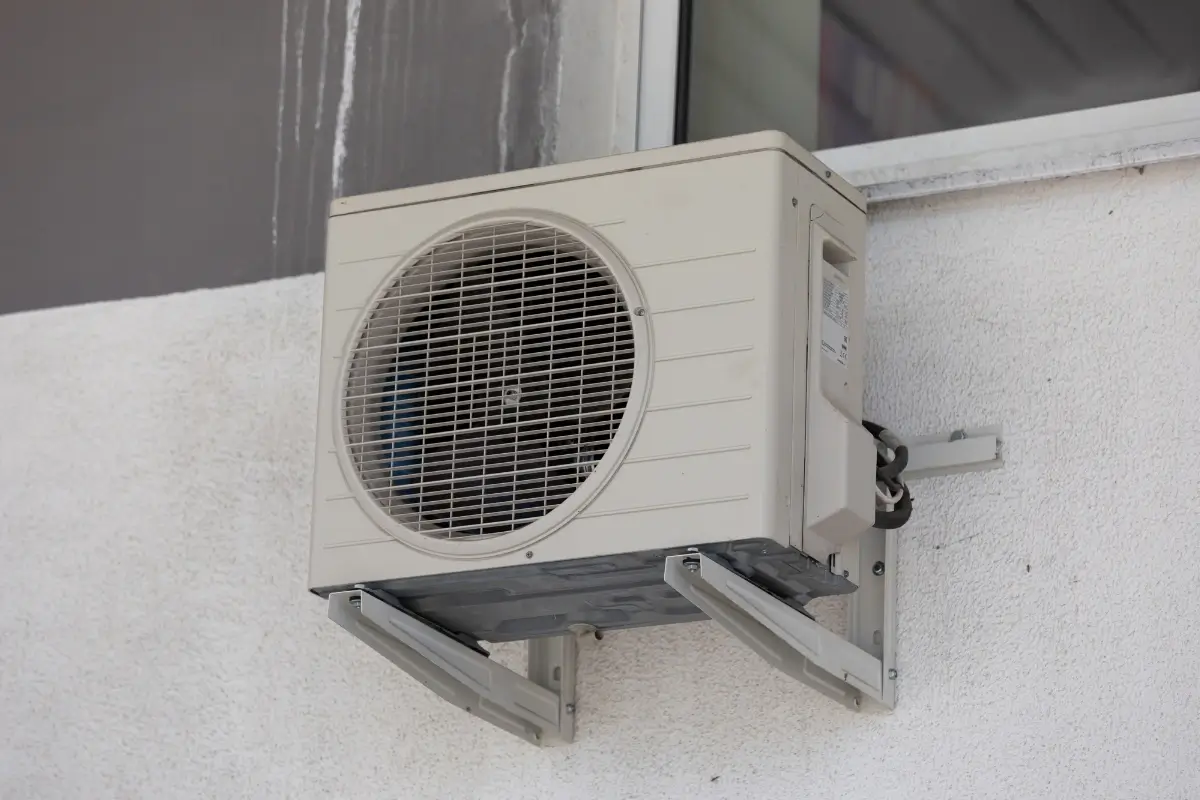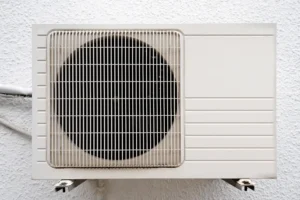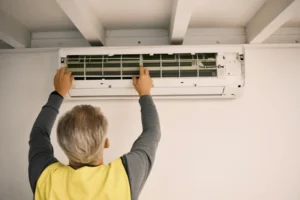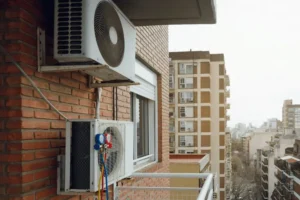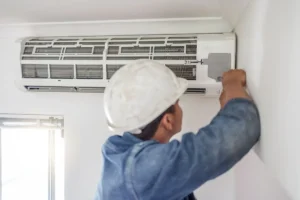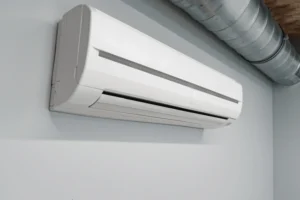Ductless heat pumps are rapidly gaining popularity in Ottawa as homeowners look for efficient and flexible ways to heat and cool their homes. These systems offer a modern solution for homes without existing ductwork, provide excellent energy savings, and allow for precise temperature control in different rooms. In this article, we will explore the most frequently asked questions regarding ductless heat pump installation, covering everything from costs and benefits to maintenance, rebates, and the installation process.

What is a ductless heat pump?
A ductless heat pump is an advanced HVAC system designed to provide both heating and cooling without the need for traditional ducts. Unlike central HVAC systems that rely on ductwork to distribute air, ductless heat pumps use refrigerant lines to connect an outdoor compressor unit to one or more indoor air-handling units. These indoor units, often mounted on walls or ceilings, allow for individual room control, a feature known as zoned heating and cooling.
The key components of a ductless system include:
- Outdoor compressor/condenser: This unit absorbs and releases heat depending on the season.
- Indoor air-handling units: These are responsible for blowing conditioned air into the rooms.
- Refrigerant lines: These connect the indoor and outdoor units and allow heat transfer.
- Remote control or smart thermostat: Many systems now offer app-based controls for added convenience.
Because these systems do not require ductwork, they are particularly beneficial for older homes, home additions, or areas where running ducts is impractical or cost-prohibitive.
How much does it cost to install a ductless heat pump in Ottawa?
The cost of installing a ductless heat pump in Ottawa can vary widely depending on multiple factors, including the size of your home, the number of zones, the brand, and the complexity of installation. Generally, homeowners can expect:
| System Type | Typical Cost Range (CAD) |
| Single-zone system | $2,000 – $6,000 |
| Multi-zone system | $6,000 – $10,000+ |
Factors influencing the cost:
- Number of zones: Each indoor unit installed for a separate zone adds to the overall cost. A single-zone system typically covers one room or area, while a multi-zone system can heat and cool multiple rooms independently.
- Brand and efficiency: Higher-end brands with advanced features, such as inverter technology and smart controls, tend to be more expensive but offer better energy efficiency and performance.
- Installation complexity: Homes with limited access or difficult wall placement for units may require additional labor, which can increase the cost.
- Electrical upgrades: Some older homes may need electrical panel upgrades or new circuits to accommodate the system.
Getting multiple quotes from licensed HVAC contractors is recommended to ensure competitive pricing. While upfront costs may seem high, ductless heat pumps are highly energy-efficient, which can reduce monthly utility bills significantly over time.
Are there any rebates available for ductless heat pump installation in Ottawa?
Yes, residents of Ottawa may qualify for financial incentives that reduce the upfront costs of ductless heat pumps. Some of the primary programs include:
- Canada Greener Homes Grant: Homeowners can receive up to $10,600 in grants and access to interest-free loans of up to $40,000 for energy-efficient upgrades, including ductless heat pumps. Eligibility requires EnerGuide evaluations before and after installation, and the heat pump must meet specific efficiency standards.
- Provincial and utility incentives: Some local electricity providers may offer rebates or discounts for installing high-efficiency heat pumps, reducing the overall cost further.
To take full advantage of rebates, homeowners should work closely with licensed contractors who are familiar with the application process and ensure the system meets all program requirements. Proper documentation and receipts are essential for claiming these incentives.
What are the benefits of installing a ductless heat pump?
Ductless heat pumps offer a wide range of advantages, making them an attractive choice for Ottawa homeowners. Here are the primary benefits:
- Energy Efficiency: Ductless systems eliminate energy losses associated with ductwork, which can account for up to 30% of energy loss in traditional HVAC systems. Many units use inverter technology, which adjusts the compressor speed based on demand, further improving efficiency.
- Zoned Heating and Cooling: Each indoor unit can be controlled independently, allowing homeowners to customize temperatures in different rooms. This zoning capability helps reduce energy waste in unused areas.
- Enhanced Comfort: Ductless heat pumps provide consistent temperature control without the hot and cold spots often experienced with conventional systems.
- Quiet Operation: Modern units are extremely quiet, with some models operating at levels as low as 19 decibels indoors.
- Improved Indoor Air Quality: Ductless systems often include advanced filtration systems that remove dust, pollen, allergens, and other airborne particles.
- Flexibility in Installation: Ideal for homes without ducts, new additions, or retrofits, ductless heat pumps can be installed with minimal disruption.
- Environmentally Friendly: Heat pumps use electricity rather than fossil fuels, reducing greenhouse gas emissions and supporting sustainable home energy use.
How often should I maintain my ductless heat pump?
Regular maintenance is crucial for ensuring the longevity, performance, and efficiency of a ductless heat pump. While homeowners can perform basic maintenance tasks themselves, professional service is recommended at least once a year. Key maintenance steps include:
- Cleaning or replacing filters: Filters should be cleaned every 2-4 weeks during heavy use to ensure proper airflow.
- Inspecting and cleaning indoor and outdoor units: Dust, debris, and leaves can accumulate on the outdoor unit, affecting efficiency.
- Checking refrigerant levels: Low refrigerant can reduce heating and cooling performance.
- Inspecting electrical connections and controls: Ensures safe and reliable operation.
- Clearing drainage lines: Prevents water leaks or mold growth from condensation.
Regular maintenance not only prolongs the system’s lifespan but also maintains optimal energy efficiency and prevents costly repairs.
Installation Process: What to Expect
Installing a ductless heat pump requires careful planning and professional expertise. The general installation process involves several steps:
- Initial Consultation: A licensed HVAC technician assesses your home’s heating and cooling needs. They determine the appropriate size, system type, and the best locations for indoor and outdoor units.
- Site Evaluation: The technician evaluates potential mounting locations for the indoor units, taking into account airflow, aesthetics, and ease of maintenance. The outdoor unit placement is also considered for optimal performance and minimal noise.
- Installation of Units: The outdoor compressor is installed on a stable platform or wall bracket, while the indoor units are mounted according to the site evaluation. Refrigerant lines, drainage, and electrical connections are then installed between the units.
- System Testing: The system is carefully tested for proper operation, including airflow, refrigerant levels, and temperature control.
- Homeowner Education: The technician demonstrates how to operate the system, set timers, adjust temperature zones, and maintain filters.
Depending on the number of zones and the complexity of the installation, the process may take one to three days to complete.
FAQs
Can I install a ductless heat pump myself?
While minor maintenance can be done by homeowners, installation requires licensed HVAC professionals to ensure safety, warranty compliance, and proper refrigerant handling.
How long does a ductless heat pump last?
With proper maintenance, ductless heat pumps typically last 15–20 years, which is comparable or superior to conventional HVAC systems.
Will a ductless system heat my entire home in Ottawa winters?
Modern heat pumps are highly efficient even in cold climates. However, extremely low temperatures may require supplemental heating for certain homes, depending on insulation and size.
Are ductless heat pumps noisy?
Indoor units are very quiet, typically operating at 19–40 decibels. The outdoor compressor is slightly louder but generally unobtrusive.
How do ductless heat pumps compare to central air systems?
Ductless systems save energy by eliminating duct losses, allow room-by-room temperature control, and are easier to install in homes without existing ducts. Central air systems may still be preferable in large homes with pre-existing ducts.
Tips for Choosing the Right System
When selecting a ductless heat pump, consider the following:
- Capacity: Choose a system sized appropriately for your home. Oversized units waste energy, while undersized units fail to maintain comfort.
- Brand reputation: Look for brands with reliable service, warranties, and local support in Ottawa.
- Energy efficiency rating: Units with higher SEER (Seasonal Energy Efficiency Ratio) and HSPF (Heating Seasonal Performance Factor) provide better efficiency and savings.
- Smart features: Modern heat pumps offer app controls, scheduling, and integration with home automation systems for added convenience.
Advantages of Multi-Zone Systems
For larger homes, multi-zone ductless heat pumps offer significant benefits:
| Feature | Benefit |
| Multiple indoor units | Allows different rooms to have customized temperatures |
| Individual controls | Reduces energy consumption by cooling/heating only the rooms in use |
| Easy expansion | Additional units can be added without major renovation |
| Energy efficiency | Each zone operates independently, minimizing unnecessary energy use |
Final Thoughts
Ductless heat pumps are an excellent solution for homeowners in Ottawa who want energy-efficient, flexible, and reliable heating and cooling systems. With proper planning, installation, and maintenance, these systems provide comfort year-round, reduce energy costs, and qualify for available rebates. By understanding the installation process, cost considerations, maintenance needs, and benefits, you can make an informed decision that suits your home’s specific requirements.
Consult with a licensed HVAC contractor to assess your home’s suitability and explore options that provide maximum comfort, efficiency, and long-term value.
